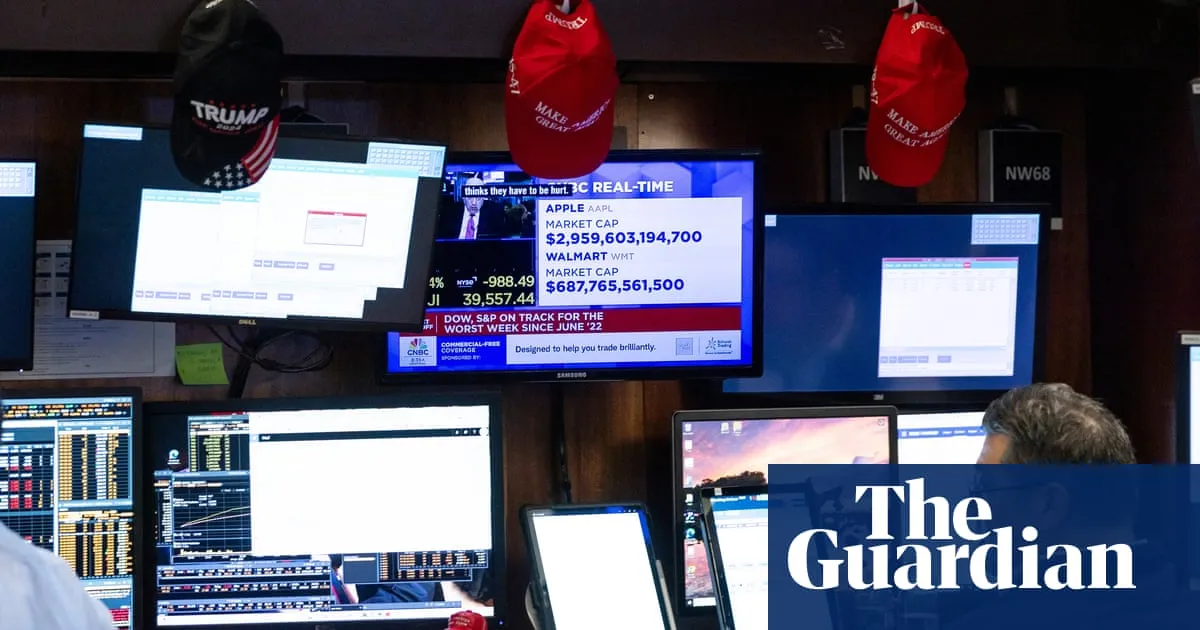
As global markets brace for yet another tumultuous week, the implementation of Donald Trump's tariffs has raised concerns about potential retaliatory actions by world leaders, further intensifying fears of a looming global recession. Last week, stock indices experienced a staggering decline of nearly $5 trillion (£3.9 trillion), with the UK and US markets facing losses reminiscent of the early days of the Covid-19 pandemic. Investors are taking precautionary measures as the trade war initiated by Trump unfolds.
Analysts are cautioning that the Trump administration shows no signs of reversing its so-called "liberation day" tariffs, which are expected to keep market volatility elevated. Roman Ziruk, a senior market analyst at Ebury, expressed his concerns, stating, “Volatility will likely stay elevated as we move into the week.” Despite some investors hoping for a delay or reconfiguration of tariffs against China and the EU, analysts emphasize that the risk of escalating trade tensions remains significant. Ziruk noted, “The danger of escalation of trade tensions cannot, however, be overlooked, particularly as China’s response to the latest round of US tariffs has been more aggressive than before.”
Leading figures within the Trump administration have issued warnings against any expectations of a policy reversal. Commerce Secretary Howard Lutnick stated in television interviews that President Trump aims to "reset global trade." Meanwhile, EU leaders are still deliberating their response, and UK Prime Minister Keir Starmer has pledged to “shelter” British businesses from the impact of tariffs, indicating that he will soon announce measures to mitigate the economic fallout.
Starmer is expected to advocate for an economic reset, which may include reevaluating the Labour Party’s commitment to avoid tax increases, especially in light of a potential global trade slowdown. Treasury Minister Darren Jones commented that the era of globalisation might have “come to an end,” although he expressed hope for a trade deal with the White House.
The initial 10% tariff imposed on the UK is among the lowest of Trump's sanctions, with exceptions for countries like Russia, North Korea, Belarus, and Cuba. However, the existing 25% tariff on UK steel and cars has already prompted companies like Jaguar Land Rover to pause shipments to the US, which accounts for about a quarter of their annual sales of 400,000 vehicles.
Economic forecasters warn that the widespread and punitive nature of these tariffs could push the UK economy into decline. Analysts at Barclays have downgraded their growth forecasts for both the UK and the EU, suggesting that a recession may be imminent in the latter half of the year. Erik F Nielsen, chief economics adviser at UniCredit Bank, stated, “It’s too early to estimate the impact of these economic weapons of mass destruction. But it’ll be bad – very bad – for US growth, and for growth across the rest of the world.” The possibilities of a recession in the US and potentially a global recession are becoming increasingly tangible.
Amid these developments, Elon Musk, the world's richest individual and a key ally of Trump in the business realm, expressed hope for the establishment of a free-trade zone between the EU and the US, advocating for a tariff-free environment. Nonetheless, tariffs of 20% on European imports and 34% on Chinese goods are set to take effect at 12:01 AM on Wednesday.
European leaders have condemned these tariffs, with French President Emmanuel Macron encouraging businesses to reconsider investments in the US. Ursula von der Leyen, president of the European Commission, has called for negotiations with the US, while the EU plans to announce retaliatory tariffs on US consumer and industrial goods, which may include popular products such as orange juice, denim, and Harley-Davidson motorbikes.
In response to the tariffs, Beijing has already implemented retaliatory measures. George Magnus, a China economy expert, noted that a long-term resolution is still possible. He stated, “Neither Trump nor Chinese President Xi Jinping want a full-blown trade war right now.” Both leaders face significant domestic economic challenges and must carefully manage trade relations to avoid exacerbating their respective economic situations.
Magnus cautioned about the long-term implications of Trump’s efforts to diminish China’s control over global supply chains. He remarked, “The world must either pay Trump now via tariffs, or pay Xi Jinping later through lost manufacturing and jobs.” As the global economy teeters on the brink of a recession, the coming weeks will be critical in determining the trajectory of international trade relations.